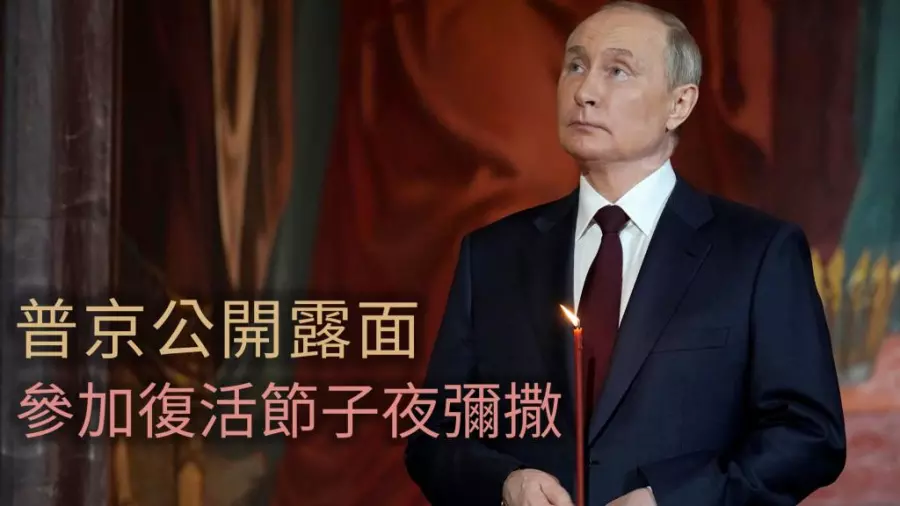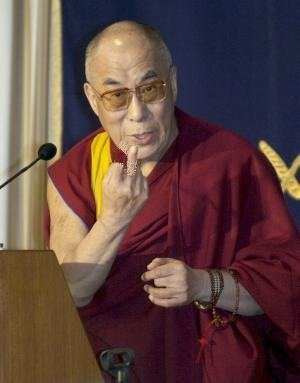| 沙文 2022/4/26 06:50 |

俄羅斯總統普京公開露面,上周六午夜時分在莫斯科一座東正教教堂內,參加復活節彌撒。自從普京於2月底下令出兵攻入烏克蘭以來,俄羅斯東正教會一直擺出支持克里姆林宮的立場。
在現場直播的畫面中,見到身穿深藍色西裝、白恤衫及結上深紫色領帶的普京進入莫斯科基督救世主主教座堂內,站在其中一邊,手持一根燃點了的紅色蠟燭。普京神情嚴肅,不時抬頭仰望。
儀式進行期間,普京數次在胸前做出比劃十字架的手勢。當首牧基里爾宣布「基督已經復活」時,普京和教堂內其他信眾回應:「他真的復活了。」除此之外,普京沒有發表講話。
普京數次在胸前做出比劃十字架的手勢。AP
周六較早時候,基里爾在莫斯科主持另一個戶外宗教儀式時發表講話,表示期盼烏克蘭戰爭早日結束,但他沒有公開譴責俄方的軍事行動。過去一、兩個月,基里爾曾發表言論,支持普京政府軍事介入烏克蘭。他的取態受到各方質疑,也令全世界的東正教會分裂。
| beebeechan 2022/4/26 07:35 |
大陸既三自教會都要話愛黨愛國多過愛上主架哩, 無得揀
| beebeechan 2022/4/26 07:38 |
真係識既人要掩住大半臉來笑
| 沙文 2022/4/26 08:15 |
呢位弟兄笑容幾咁燦爛
| beebeechan 2022/4/26 11:04 |
你呢舖就令佢笑唔出, 喊都無謂

| 沙文 2022/4/29 22:41 |
去路透社門口自焚抗議啦笨七加個箍
Russia's Putin attends midnight Orthodox Easter mass in Moscow[size=0.8125]
Author of the article:
Publishing date:
Apr 23, 2022 • 5 days ago • 1 minute read • Join the conversation
Article content
President Vladimir Putin on Sunday attended an Easter mass conducted by the Russian Orthodox Church, which has strongly backed the Kremlin leader’s “special military operation” in Ukraine.
Putin, dressed in a dark blue suit, a white shirt and dark purple tie, stood to one side in Moscow’s Christ the Saviour Cathedral, holding a lit red candle, live images of the midnight service showed.
The Russian leader crossed himself several times during the ceremony. When Patriarch Kirill announced “Christ has risen,” Putin joined the other members of the congregation with the reply “Truly he is risen.” He otherwise did not speak.
| 沙文 2022/4/29 22:51 |
Orthodox Holy Saturday
Holy Saturday is the day between Jesus Christ's crucifixion (Good Friday) and his resurrection (Easter Sunday), according to Christian belief. Many Orthodox Christians commemorate the burial of Christ on this day.
What Do People Do?
Holy Communion can be received on Holy Saturday morning in some Orthodox churches in countries such as the United States. Some churches hold a midnight liturgy between Holy Saturday and Easter Sunday.
In Greece, Holy Saturday is filled with the anticipation of celebrating Easter Sunday. In some areas, people begin to gather in the churches and squares in cities, towns and villages by 11pm for the Easter liturgies. Many people carry large white candles and the church bells toll as the priests announce “Christ is Risen!” at midnight between Holy Saturday and Easter Sunday. Fireworks are set off and each person in the crowd responds with set joyous responses. After this, everybody goes home for a meal – the fasting period is over. If their candles are still burning, a cross is made in the doorway with the soot to protect the house for the coming year.
An Easter liturgy is also held on Saturday night in many Russian Orthodox churches. Worshippers congregate in a darkened church. As midnight approaches, worshippers light candles and church bells announce the resurrection of Christ at midnight. An intensely joyful Orthodox liturgical chant can be heard throughout the streets in some parts of Russia until the conclusion of Easter liturgy at dawn.
In Lebanon, which also observes the Orthodox Easter, it is traditional that on the afternoon of Easter Saturday people visit seven churches to be blessed at each of them. Some people place a piece of dough in a tree on Saturday night, believing it will be blessed by Christ. On Sunday evening they place small pieces of that dough in other food containers so that these will also become blessed.
Many people flock to the Church of the Holy Sepulchre in Jerusalem, which is believed to be the site of Jesus Christ's burial, on Holy Saturday. They come to this place to experience an annual event, which is deemed as a miracle, known as the Holy Fire. According to many Orthodox Christian sources, this fire occurs annually at the same place and time, and in the same manner. The Holy Fire liturgy is broadcast live in countries such as Greece and Russia.
Public Life
The Easter period is officially observed in countries including: Bulgaria, Cyprus, Greece, Lebanon, Republic of Macedonia, Romania and Ukraine. There are no federal Orthodox Holy Saturday public holidays in countries such as Australia, Canada, the United Kingdom, and the United States. However, it is a time for families and friends of the Orthodox Christian faith to gather together and to celebrate the Orthodox Easter period.
Background
Holy Saturday is the day between Jesus’ death and his resurrection. Many Orthodox churches contemplate the mystery of Jesus Christ’s descent into Hades, the world of the dead. According to the story of Christ’s death and resurrection, death is defeated from within. It is the day of watchful expectation when mourning is transformed into joy. Holy Saturday is part of the Easter period observed by both Orthodox and western churches alike, although Easter dates often tend to differ between the churches.
The Council of Nicaea established the Easter date for churches around the world in 325CE but not all Christian churches observed Easter according the Gregorian calendar after it was first introduced in 1582. Many Orthodox churches still observe Easter in accordance with the Julian calendar. Therefore the Orthodox Easter period occurs later than the Easter period that falls around the time of the March equinox.
In the Orthodox circles, tensions exist between New Calendarists – those who use the revised Julian calendar for calculating the feasts of the ecclesiastical year – and Old Calendarists – those who continue to use the traditional Julian calendar. There have been a number of proposed Easter date reforms. In 1997 the World Council of Churches proposed a reform to solve the Easter date difference between churches that observe the Gregorian calendar and those that observe the Julian calendar. So far, this reform has not been implemented.
Symbols
The tomb of Christ is an important symbol on Holy Saturday – it is no ordinary grave because it does not represent a place of corruption, decay and defeat. It is life-giving, a source of power, victory and liberation.
During Holy Saturday it is customary for the clergy and people to hold candles during the singing of the Lamentations and at the procession of the Epitaphios, an icon most often found as a large cloth, embroidered and often richly adorned,. This practice is rooted in ancient Christian burial practices. Candles are lit to symbolize the victory of Christ over death, and to express as well the church's belief in Christ’s resurrection.
In many Russian Orthodox churches, the darkened church on Holy Saturday symbolizes the despair of a world without faith in Jesus Christ. Historically, the eve of Holy Saturday was considered a haunted time when satanic creatures tormented townsmen. People were afraid to go out after dark, but persevered to attend a liturgy because the church was considered a safe haven. As midnight approaches, candles are lit and, at midnight, church bells ring as a symbol of Christ’s resurrection.
| 沙文 2022/4/29 22:53 |
| 沙文 2022/4/30 02:01 |
丟那媽真係黑鳩媽媽midnight Orthodox Easter mass,您未玩過crossover, 瞓唔著就不妨試下
嗱佢真係有笑㗎冇搵你笨喎
| beebeechan 2022/4/30 05:56 |
黑鳩媽媽就係搣泥?
真係達賴喇嘛.........

| 沙文 2022/5/1 01:16 |
https://www.fjordtours.com/inspi ... ight-sun-explained/

